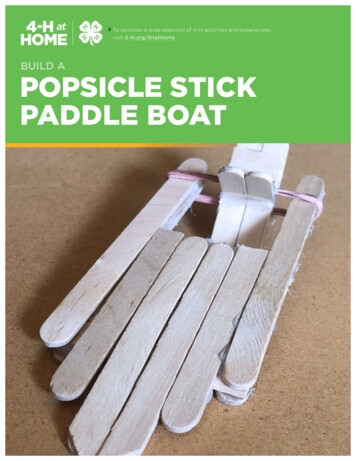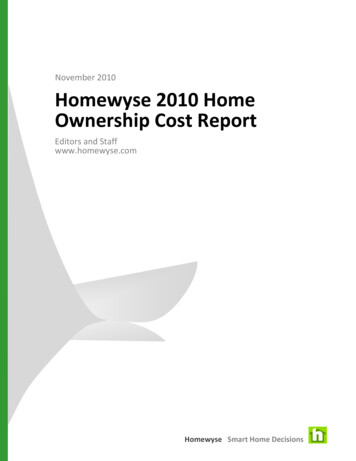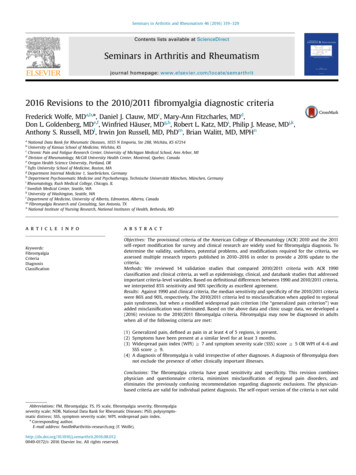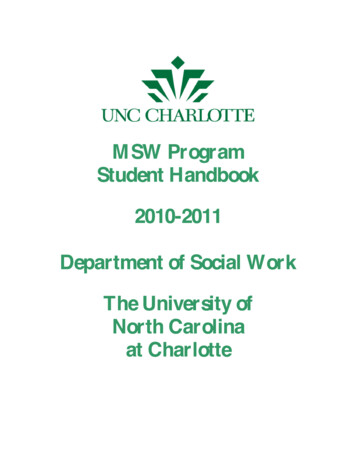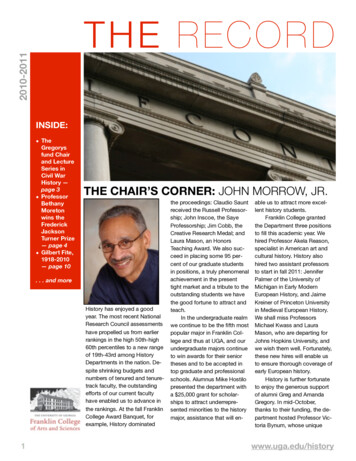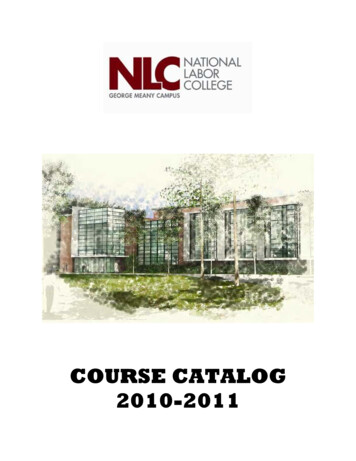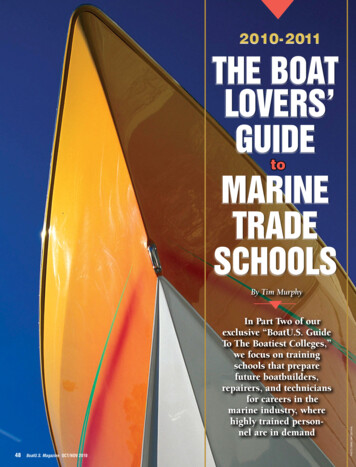
Transcription
2010-2011The boatlovers’GuidetoMarineTradeSchoolsIn Part Two of ourexclusive “BoatU.S. GuideTo The Boatiest Colleges,”we focus on trainingschools that preparefuture boatbuilders,repairers, and techniciansfor careers in themarine industry, wherehighly trained personnel are in demand48BoatU.S. Magazine OCT/NOV 2010Photo ONNE VAN DER WALBy Tim Murphy
For anyone who has thought about acareer in the marine trades — say,as a boatbuilder, designer, or marinetechnician — there’s a world of topnotch one- or two-year technical programsacross the country created to open a directpath to a lifelong career in and aroundboats. Trade schools, community colleges,accredited certification programs — theseare the focus of this BoatU.S. Magazineroundup of post-secondary schools. Someoffer state or industry certification; others, an associate’s degree. Still others offerboth.In exploring these courses, we seea trend that promises two sustainablebranches for growth: one for the personsetting off on a new career in the marineindustry; the other for the deliberate raisingof the bar on standards-based work acrossthe field. Together these trends promise tokeep boat owners boating and marine tradeprofessionals in steady demand.Photo By Billy Black, bottom rightStarting With StandardsRoger Hellyar-Brook envisions a different future for boatyards. It’s a futurein which the staff to whom boat ownersentrust the care of their second-biggestinvestment no longer rely on on-the-jobtraining and a hit-or-miss approach torepairs. It’s a future no longer built onthe promise that “your boat will be readyFriday,” when everybody — customer andtechnician alike — knows that’s not likely.“I call it the Lexus model of customerservice,” says Hellyar-Brook. “When youbring in your Lexus for service, you’reoffered coffee in a clean waiting room withsofas and TV and magazines to read. If it’sa longer project, they’ll even give you aloaner car. It may be more expensive, butif you’re told the vehicle will be ready onFriday, you’ll get it on Friday. And it’ll befixed right.”Hellyar-Brook is a former merchantmariner from the north of England and itdoesn’t take long to understand that thisis a man who knows his trade. For overa decade, Hellyar-Brook has directed andtaught the marine-systems program at TheLanding School in Arundel, Maine. Inaddition to marine systems, The LandingSchool also offers programs in woodenboatbuilding, composite boatbuilding, andyacht design.Listen as Hellyar-Brook describes whathe calls the Trojan Project: “Every year, justbefore Christmas, we give the students theirfirst big independent homework. They haveto go aboard this 30-foot twin-engine gascruiser and document every system: sani,potable water, fuel, engine, starting andcharging, all the DC and AC wiring. Thenthey do schematics, diagrams, a parts list.Does it comply with standards or not in allthe wire gauges and hose sizes? And whatabout the compatibility of materials?”With the merest wink, Hellyar-Brooksays one more thing about this particularaging vessel: “It’s very atypical.”In the late 1990s, The Landing Schoolpioneered a yearlong marine-systems curriculum that hews closely to the standardslaid out and adopted by the AmericanBoat and Yacht Council (ABYC). In fact,Hellyar-Brook was disappointed when thestandards body began offering open-booktests for certification; he’d been turningout students who carried the standards intheir heads.Since then, other trade schools acrossthe country have worked even more directly with the ABYC to write curricula that arein line and up to date with the latest needsof the industry the students are beingtrained to enter.Until about five years ago, theInternational Yacht Restoration School(IYRS, pronounced “iris”) in Rhode Islandwas known exclusively for its two-year boatbuilding and restoration program, whichfocuses on historic wooden yachts. Butafter talking with marine-industry leaders,the school explored which skills the industry most needed. What resulted from thoseconversations was the first comprehensivemarine-systems curriculum fully co-writtenwith the ABYC. That nine-month programgraduated its third class in June.“We wanted to make sure of twothings with this curriculum: that it’s industry-based, and that it’s written with boththe standards and certification in mind,”said Susan Daly, IYRS vice president of programming. “We wanted to both teach thestandards and prepare anybody who goesthrough the curriculum to take the specificABYC exams.” This fall, IYRS added a ninemonth composites technology program,also developed in close collaboration withindustry leaders.Both the IYRS and The Landing Schooloffer “clock-hour” programs — studentsclock in at 8 a.m. and out at 4 p.m., fivedays a week, as they would on a work site.Historically, both schools have focused onintensive skills preparation leading directlyto certification, although both have recently made agreements with nearby colleges toalso offer degrees. Both schools attract students from all over the United States andabroad, with a mix of recent high-schoolgraduates and mid-career folks.captionA student at Skagit Valley College, Washington, getsready to install a lower unit.All hands on deck at the Cape Fear CommunityCollege, North Carolina.At work in systems class at the International YachtRestoration School in Rhode Island.BoatU.S. Magazine OCT/NOV 201049
Two Career-Path ChoicesAlexandria Technical College (MN) www.alextech.eduAutomotive Training Center (PA) www.autotraining.eduThe Boat School at Husson University (ME) www.boatschool/husson.netCape Fear Community College (NC) www.cfcc.edu/martechCarteret Community College (NC) www.carteret.eduCecil Community College (MD) www.cecil.eduCedar Valley College (TX) www.cedarvalleycollege.eduChattanooga State Technical Community College (TN) www.chattanoogastate.eduCollege of the Albemarle (NC) www.albemarle.eduEHOVE Ghrist Adult Career Center (OH) www.ehove.netFlorida Keys Community College (FL) www.fkcc.eduGeorge Stone Career Center (FL) neserv/Index.aspHennepin Technical College (MN) n/marine.htmInternational Yacht Restoration School (IYRS) (RI) www.iyrs.orgIowa Lakes Community College (IA) www.iowalakes.eduKingsborough Community College (NY) www.kbcc.cuny.eduLake Washington Technical College (WA) www.lwtc.eduLanding School (ME) www.thelandingschool.orgLouisiana Technical College of Alexandria (LA) www.ltc.eduMadison Area Technical College (WI) www.matcmadison.eduManatee Technical Institute (FL) www.manateetechnicalinstitute.orgMarchman Technical Education (FL) www.discovermtec.comMarine Mechanics Institute (FL) www.uti.eduMaritime Professional Training (FL) www.mptusa.com/schedule/index.htmlMassasoit Community College (MA) www.massasoit.mass.edu/acad depts/certs/marine.cfmMcFatter Technical Center (FL) www.mcfattertech.comMinnesota State Community and Technical College (MN) www.minnesota.eduMotoring Technical Training Institute (MA) www.mtti.eduNew England Institute of Technology (RI) www.neit.eduNorth Dakota State College of Science (ND) www.ndscs.nodak.eduNorth Georgia Technical College (GA) www.northgatech.eduNorthwest School of Wooden Boatbuilding (WA) www.nwboatschool.orgNorthwestern Michigan College (MI) www.nmc.eduOcean County Vocational Technical School (NJ) www.ocvts.org/htm/programs/marine.htmlOkaloosa Applied Technology Center (FL) www.okaloosa.k12.fl.us/oatc/Peninsula College (WA) www.pc.ctc.eduPinellas Technical Education Centerm (FL) www.myptec.org/?page MarineServiceTechnolProBoat E-Training (ME) www.proboate-training.comRappahannock Community College (VA) www.rappahannock.eduSanta Barbara City College (CA) www.sbcc.edu/marinedivingSeattle Central Community College (WA) www.seattlecentral.eduSkagit Valley College (WA) www.skagit.eduUniversity of Hawaii, Honolulu Community College (HI) http://tech.honolulu.hawaii.edu/marr/Westlawn Institute of Marine Technology (ME) www.westlawn.eduWisconsin Indianhead Technical College (WI) www.witc.edu/pgmpages/mmopp/index.htmWyotech (FL) http://www.wyotech.com/watercraft.php50BoatU.S. Magazine OCT/NOV 2010Panorama of a yacht (left) getting the full restoration treatment at the International Yacht RestorationSchool in Rhode Island.Photo Caitlin woodThe List: America’s Marine Technical ProgramsIf you’re considering a marine technical school, you’ll need to make twodecisions. The first is which sector totrain for — manufacturing or service. Thesecond is whether to seek a certificate or adegree. The difference between training formanufacturing versus service comes downto how much of the curriculum teachestroubleshooting and problem-solving. Theservice sector obviously requires more ofboth, and it’s during a recession thatthe distinction between the two becomesespecially pronounced. “I’ve been throughseveral economic downturns in the marineindustry,” said ABYC curriculum developerEd Sherman. “I can tell you that in everyinstance, the service sector has alwaysbeen the anchor that’s held it all togetherin terms of jobs.”Recent information from schools bearsthat out. “Marine systems graduates are inthe highest demand,” said Nicole Jacquesof The Landing School in June. “Whilenew boats may not be designed and builtin a poor economy, existing boats alwaysneed maintenance. Our marine systemsprogram graduates often have several certifications and a broad, solid understandingof electrical, engines, plumbing, steering,etc., which makes them particularly valuable to employers in yards.”Daly at IYRS concurs. “We have seenparticular strength in the service/maintenance and marina sectors. So our marinesystems graduates have had good successin getting employed. There are pockets ofgrowing demand in the restoration sector and again, our graduates have foundjobs.”The intensity of such clock-hour programs as described above focuses much ofa student’s attention on those problemsolving skills needed to service existingboats. It’s also true that many studentscome in to these programs with degreesalready in hand. “Half of our studentsalready have college degrees when theyarrive,” said Daly.But if you don’t have a degree, yournext big question is: certification or degreeprogram? The big difference between themcomes in the many general-education credits — English, math, social sciences —that students need in order to achievean associate’s degree. To get an idea ofthe proportion, IYRS’s two-year boatbuild-
ing and restoration program translates toone semester’s worth of credits towarda two-year associate’s degree from theCommunity College of Rhode Island.Steve Kitchin is the vice president forcorporate education and training at NewEngland Institute of Technology, as wellas the chairman of the Marine IndustryTraining & Education Council (MITEC,see sidebar). “Every study that’s been doneabout skills and the future of the Americanworkforce,” said Kitchin, “indicates thatfor long-term success, people who havedegrees perform better in the labor market— both in terms of the options made available to them and in terms of their financialwherewithal.”If getting a degree is your biggest priority, programs affiliated with communitycolleges or universities may offer the mosteffective path. The key is to make sure theprogram you choose offers the course ofstudy you want. For example, communitycurriculum is now available at five community colleges around the country: The BoatSchool at Husson University in Eastport,Maine; Broward College in Miami, Florida;Honolulu Community College in Hawaii;Rappahannock Community College inWarsaw and Glenns, Virginia; and SkagitValley College with a new facility inAnacortes, Washington. ABYC hopes toadd a school in New England and theGreat Lakes to its Marine League, according to Sherman.“The beauty of the Marine League ofschools is that we’re now in the process ofstandardizing our instruction from coast tocoast,” said Skagit Valley’s Mike Swietzer.“It’s an even playing field now, and theworkforce can intermingle wherever theychoose to locate themselves. This is something that we’ve needed for quite a while.”Students at Skagit Valley in Washingtonstate go through a core marine program intheir first year, then specialize in the sec-Photo Judith gardnerStudents at the International Yacht Restoration School in Rhode Island get to work on engine systems.colleges, by definition, reflect the needs ofthe region where they exist. So if you’relooking for deep training in service, butyou live in a region where boatbuildingprevails, you may want to look beyond thenearest school.In an effort to promote the latestmarine standards and mitigate local differences, ABYC (in collaboration with IYRS)launched in 2008 what it calls the MarineLeague of schools. Based on 13 modules — marine electrical, plumbing, fueland water tankage, pumps, propane andnatural gas, fire protection, steering, andothers, with a healthy dose of troubleshooting throughout — the Marine Leagueond year. “Our first-year program includesgeneral boat studies, lofting, tools andsafety, and engines. Students get a generalknowledge of what the marine trades are allabout, and in the first year, if they choose,they get their ABYC certification,” Swietzersaid. For their second year, students choosean area of specialization, ranging from boatproduction, boatyard repair, charter-boatrepair, or independent employment. Gened courses are designed to dovetail witheach student’s specialty.To find out more about marine tradesprograms near you and around the country, the best source of information comesfrom MITEC (www.boatingcareerinfo.org).Students on the marine technology programat Cape Fear Community College, NorthCarolina, spend 32 days underway on theschools 85-foot vessel Dan Moore.MITEC: Your Best FriendIn Marine EducationThe Marine Industry Training &Education Council (www.boatingcareerinfo.org) offers the best gathering of online resources for anyonealready working
Landing School in Arundel, Maine. In addition to marine systems, The Landing School also offers programs in wooden boatbuilding, composite boatbuilding, and yacht design. Listen as Hellyar-Brook describes what he calls the Trojan Project: “Every year, just before Christmas, we give the students their first big independent homework. They have to go aboard this 30-foot twin-engine gas cruiser .
